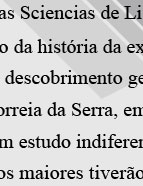

................................
He strictly follows what was then known about the discovery of the west coast of Africa until 1460, to move on to the expeditions of Diogo Cão and Bartolomeu Dias. He also further discusses the voyages of Vasco da Gama, Pedro Álvares Cabral, and João da Nova. He reports at length on the accomplishments of D. Francisco de Almeida and Afonso de Albuquerque - and those who followed him in order to focus on the presence of the Portuguese in the Moluccas, China, and Japan. He then shifts from Portuguese expansion in the eastern seas to the voyage of Fernão de Magalhães and the issues raised by the presence and exploration of the Moluccas. He considered Fernão de Magalhães "one of the most eminent navigators of all time, if not perhaps the greatest of all. (Ibid., p. 410).
The Portuguese version of History by Sophus Ruge was the first work to advance an overview of what was known and thought at the time on such matters. However, its German original was not recent, as it dated back to 1881 – and was included in vol. XIII of the great História Universal [Universal History] directed by Wilhelm Oncken (1838-1905). The latter had the advantage of seeking a comprehensive view of the entire European expansion throughout the world, not just of one nationality or other. The efforts of the Portuguese, the Spanish and the English are all duly explained.
Manuel Maria d'Oliveira Ramos, professor of the Curso Superior de Letras [ former faculty of Arts] and later of the Faculdade de Letras de Lisboa [Lisbon Faculty of Arts], is responsible for the Portuguese version of the Historia da epoca dos descobrimentos [History of the age of discoveries], "revised, expanded and complemented with numerous notes on the Portuguese maritime epic”. This publication is believed to have been released in around 1916. And there were consequences: its translation and publication are likely to have contributed decisively to the creation of the chair of História dos Descobrimentos e da Colonização [History of the Discoveries and Colonisation] in Portuguese Universities. Professor Oliveira Ramos most likely promoted the creation of this chair. This occurred in 1918 - a few years after the publication of the translation of the Historia da epoca dos descobrimentos - probably as a result of its emergence. It is not bold to assume that the creation of the chair in the curriculum of the History and Geography degree in the Faculties of Arts was likely triggered by this work. Thus, the discipline became autonomous, while remaining part of the Universal History of reference.
